Exploring the Characteristics, Behavior, and Care of Savannah and Serval Cats
If you’re interested in Savannah and Serval cats, understanding their characteristics, behavior, and proper care is essential. The following keywords will guide you through various aspects of these fascinating feline companions.
Serval Cat Characteristics: A Touch of the Wild
Serval cats possess unique characteristics that reflect their wild heritage. They have long legs, large ears, and a lean body, making them agile and excellent jumpers. Their coat features striking spots and patterns, adding to their exotic allure.
Savannah Cat Behavior: Active and Curious Companions
Savannah cats are known for their high activity levels and innate curiosity. These intelligent felines enjoy exploring their surroundings and engaging in interactive play. They often form strong bonds with their human companions and can exhibit dog-like behavior, such as playing fetch or walking on a leash.
Serval Cat Behavior: Independent and Inquisitive
Serval cats have an independent nature and an inquisitive streak. They are known for their problem-solving abilities and love to investigate their environment. It’s important to provide them with ample mental stimulation and environmental enrichment to keep their curious minds engaged.
Savannah Cat Lifespan: A Long-Term Companion
Savannah cats have a relatively long lifespan compared to many other cat breeds. With proper care and a healthy lifestyle, they can live up to 12-20 years or even longer. Regular veterinary check-ups, a balanced diet, and a safe environment contribute to their overall well-being.
Serval Cat Lifespan: A Lifelong Adventure
Serval cats have a lifespan of approximately 10-15 years in captivity. Providing a suitable habitat, a species-appropriate diet, and regular veterinary care are crucial for their well-being and longevity.
Savannah Cat Size and Weight: Impressive Stature
Savannah cats are known for their impressive size. Depending on their generation and individual genetics, they can range from medium to large in size. Some Savannah cats can weigh between 8 to 20 pounds or more, with males generally being larger than females.
Serval Cat Size and Weight: Graceful and Slender
Serval cats are medium-sized wildcats, known for their slim and graceful build. They can weigh between 20 to 40 pounds, with males typically being larger and heavier than females.
Savannah Cat Temperament: Playful and Affectionate
Savannah cats are known for their playful and affectionate nature. They often form strong bonds with their human families and enjoy interactive play. Early socialization and positive reinforcement training can help shape their friendly and sociable temperament.
Serval Cat Temperament: Independent Hunters
Serval cats have an independent temperament, reflecting their wild instincts as solitary hunters. While they can form strong bonds with their human caregivers, they still retain some independent qualities. Providing them with a stimulating environment and outlets for their natural behaviors is essential for their well-being.
Savannah Cat Care: Meeting Their Needs
Proper care of Savannah cats involves providing a balanced diet, regular veterinary check-ups, and opportunities for exercise and mental stimulation. Their litter boxes should be kept clean, and they should have access to fresh water at all times. Regular grooming, including brushing their coat and checking their ears and teeth, is also important.
Serval Cat Care: Meeting Their Unique Requirements
Serval cats have specific care needs to ensure their well-being. Their diet should mimic their natural hunting habits, consisting of a balanced raw meat-based diet. Adequate space for exercise, mental stimulation, and opportunities to exhibit natural hunting behaviors are crucial for their physical and mental health.
Savannah Cat Facts: Discovering Interesting Tidbits
Explore fascinating facts about Savannah cats, such as their origin as a cross between domestic cats and Serval cats. Learn about their unique coat patterns, which can include spotted, marbled, or both, and their reputation as active and intelligent companions.
Serval Cat Facts: Unveiling the Wild Side
Delve into intriguing facts about Serval cats, including their native habitat in Africa and their ability to leap high in the air to catch prey. Discover how their large ears aid in detecting sounds and how their unique coat patterns provide camouflage in their natural environment.
Savannah Cat Information: Understanding Their Background
Learn about the history and development of Savannah cats, including the various generations (F1, F2, etc.) and their hybrid lineage. Explore reputable sources for obtaining accurate information about these captivating feline companions.
Serval Cat Information: Uncovering Their Origins
Discover the natural habitat and habits of Serval cats in the wild. Gain insights into their behavior, dietary preferences, and unique adaptations that make them skilled hunters in their native African environment.
Savannah Cat Diet: Nourishing Their Health
A balanced and nutritious diet is essential for the overall health of Savannah cats. Consult with a veterinarian to determine the appropriate diet for your cat’s specific needs, considering factors such as age, weight, and activity level.
Serval Cat Diet: Replicating Their Natural Feeding Patterns
To meet the dietary requirements of Serval cats, a raw meat-based diet is often recommended. Consult with professionals who specialize in exotic cat nutrition to ensure your Serval cat receives the appropriate diet and essential nutrients.
Savannah Cat Health Issues: Vigilance and Care
While Savannah cats are generally healthy, it’s important to be aware of potential health issues they may face. Regular veterinary check-ups, vaccinations, parasite prevention, and prompt attention to any signs of illness or discomfort are crucial for maintaining their well-being.
Serval Cat Health Issues: Addressing Unique Needs
Serval cats may be prone to certain health issues, including dental problems and conditions associated with their reproductive system. Regular veterinary care, a balanced diet, and providing a suitable environment are essential for their long-term health.
Savannah Cat Grooming: Maintaining Their Beautiful Coats
Savannah cats have a short to medium-length coat that requires minimal grooming. Regular brushing helps remove loose hair and keeps their coat looking sleek. Additionally, routine care for their ears, teeth, and nails should be part of their grooming routine.
Serval Cat Grooming: Minimal Intervention
Serval cats have short, dense fur that doesn’t require extensive grooming. Occasional brushing helps remove loose hair and maintain the quality of their coat. Attention should also be given to regular ear cleaning and dental care.
Savannah Cat Training: Stimulating Their Minds
Savannah cats are highly intelligent and can be trained to perform various commands and tricks. Positive reinforcement training methods, using treats or clicker training, can be effective in teaching them new behaviors and providing mental stimulation.
Serval Cat Training: Enriching Their Lives
Serval cats can benefit from training and enrichment activities that provide mental stimulation and physical exercise. Target training, puzzle toys, and interactive play sessions can help satisfy their natural instincts and keep them mentally engaged.
Savannah Cat Breeding: Responsible Practices
Savannah cat breeding should be approached responsibly, adhering to ethical guidelines and ensuring the health and well-being of both the parents and kittens. Reputable breeders prioritize genetic testing, socialization, and suitable living conditions for their cats.
Serval Cat Breeding: Highly Regulated
Breeding Serval cats requires careful consideration and adherence to legal regulations and permits, as these cats are considered exotic and protected species in many countries. It is essential to consult local authorities and follow ethical breeding practices.
Savannah Cat Genetics: Understanding the Hybrid Lineage
Explore the genetic background of Savannah cats, which involves the crossing of domestic cats with Serval cats. Learn about the role of specific genes and how they contribute to the distinctive appearance and traits of Savannah cats.
Serval Cat Genetics: Unraveling Their Genetic Makeup
Delve into the genetic makeup of Serval cats and understand the inheritance of traits that define their physical appearance and behaviors. Genetic studies can provide valuable insights into the conservation and management of these unique feline species.
Savannah Cat Legal Issues: Compliance and Awareness
Owning a Savannah cat may be subject to legal restrictions or regulations in certain jurisdictions. It is crucial to research and comply with local laws regarding ownership, breeding, and transportation of Savannah cats.
Serval Cat Legal Issues: Navigating Legal Requirements
Serval cats are considered exotic animals in many places, and their ownership is often regulated. Familiarize yourself with the specific laws and requirements related to owning, breeding, and transporting Serval cats in your jurisdiction.
Buy Savannah Cat Supplies: Catering to Their Needs
When purchasing supplies for your Savannah cat, consider their specific requirements. This may include high-quality food, sturdy scratching posts, comfortable bedding, interactive toys, and other accessories designed to accommodate their size, energy, and natural behaviors.
Buy Serval Cat Supplies: Ensuring Their Well-being
Selecting appropriate supplies for your Serval cat is essential for their physical and mental well-being. This may include secure enclosures, appropriate litter boxes, specialized feeding solutions, and toys that encourage their natural hunting instincts.
Savannah Cat Accessories: Enhancing Their Environment
Explore various accessories that can enhance the living environment of your Savannah cat. From climbing trees and window perches to interactive puzzle toys and cat tunnels, these additions can provide mental stimulation and opportunities for exercise.
Serval Cat Accessories: Tailoring Their Habitat
Serval cats require specific accessories to create a suitable habitat. This may include large enclosures or outdoor enclosures with secure fencing, elevated platforms, hiding spots, and enrichment items that mimic their natural environment.
Savannah Cat Toys: Encouraging Playtime
Savannah cats have an innate need for play and mental stimulation. Choose toys that allow them to engage in interactive play, such as feather wands, puzzle toys, and treat-dispensing toys, to keep them entertained and physically active.
Serval Cat Toys: Captivating Their Wild Side
Serval cats are highly active and intelligent, requiring toys that challenge their hunting instincts. Toys that simulate prey-like movements, such as interactive wand toys and puzzle feeders, can provide hours of entertainment and mental stimulation.
Savannah Cat Beds: Providing Comfortable Resting Spots
Savannah cats appreciate having cozy and comfortable beds where they can relax and rest. Choose beds that offer adequate support and warmth, considering their size and preference for elevated or enclosed spaces.
Serval Cat Beds: Creating Cozy Retreats
Serval cats enjoy having cozy spots to retreat to and relax. Consider providing them with beds that offer privacy and comfort, such as enclosed cat caves or soft, plush beds that cater to their natural desire for warmth and security.
Savannah Cat Scratching Posts: Protecting Your Furniture
To satisfy their natural scratching instincts, provide sturdy and tall scratching posts for your Savannah cat. This will help keep their claws healthy and prevent them from damaging your furniture.
Serval Cat Scratching Posts: Meeting Their Needs
Serval cats need robust scratching posts to satisfy their instinctual need to scratch and stretch. Opt for tall, durable posts made of sisal or other cat-friendly materials to accommodate their size and strength.
Savannah Cat Litter: Choosing the Right Type
When selecting litter for your Savannah cat, consider their preferences and the ease of cleaning. Some Savannah cats may prefer unscented, clumping litter, while others may prefer alternative options such as wood pellets or paper-based litter.
Serval Cat Litter: Considering Their Habits
Serval cats have unique litter preferences, and their larger size may require more substantial litter boxes. Experiment with different litter types, such as natural clay or alternative materials, to find the most suitable option for your Serval cat.
Savannah Cat Food: Nourishing Their Health
Provide a balanced and nutritious diet to meet the dietary needs of your Savannah cat. Consult with a veterinarian to determine the appropriate food type (wet, dry, or a combination), portion sizes, and frequency of feeding based on their age, weight, and overall health.
Serval Cat Food: Mimicking Their Natural Diet
Serval cats thrive on a diet that closely resembles their natural prey. Consult with professionals experienced in exotic cat nutrition to develop a suitable feeding plan, which may involve a raw meat-based diet or specialized commercially available options.
Remember, responsible ownership and proper care are essential when considering Savannah or Serval cats as pets. Always prioritize their well-being, provide appropriate care, and comply with legal requirements to ensure a happy and healthy life for these extraordinary feline companions.



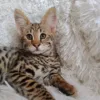
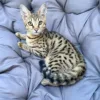

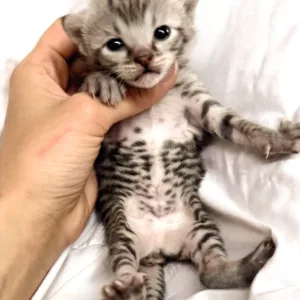
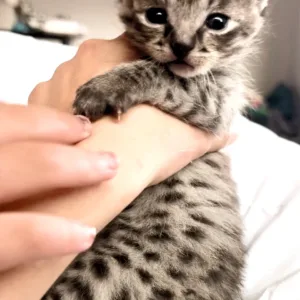
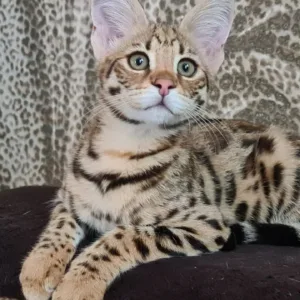

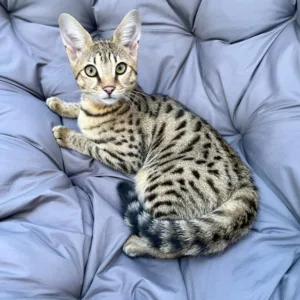
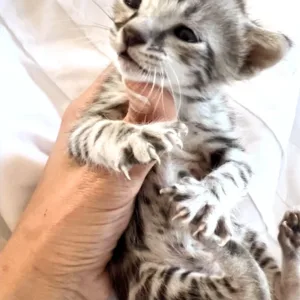


Reviews
There are no reviews yet.